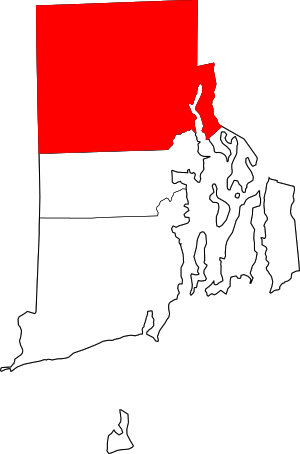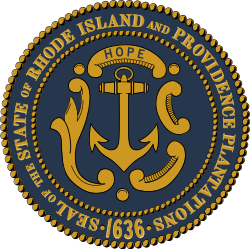North Providence, Rhode Island
North Providence is a town in Providence County, Rhode Island, United States. The population was 32,078 at the 2010 census.
North Providence, Rhode Island | |
|---|---|
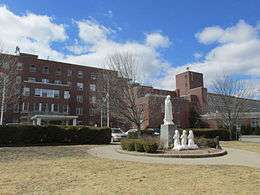 Fatima Hospital | |
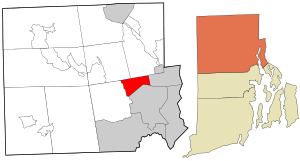 Location in Providence County and the state of Rhode Island. | |
| Coordinates: 41°51′36″N 71°27′23″W | |
| Country | United States |
| State | Rhode Island |
| County | Providence |
| Government | |
| • Type | Mayor-council |
| • Mayor | Charles A. Lombardi |
| • Town Council | Stephen L. Feola (D) Ronald Baccala, Jr. (D) Stefano Famiglietti (D) Dino P. Autiello (D) Kenneth Amoriggi (D) William Warren (D) Mansuet J. Giusti (D) |
| Area | |
| • Total | 5.9 sq mi (15.1 km2) |
| • Land | 5.8 sq mi (14.6 km2) |
| • Water | 0.2 sq mi (0.2 km2) |
| Elevation | 184 ft (56 m) |
| Population (2010) | |
| • Total | 32,078 |
| • Density | 5,627.7/sq mi (2,182.2/km2) |
| Time zone | UTC−5 (Eastern (EST)) |
| • Summer (DST) | UTC−4 (EDT) |
| ZIP codes | 02904, 02908, 02911 |
| Area code(s) | 401 |
| FIPS code | 44-51760[1] |
| GNIS feature ID | 1219763[2] |
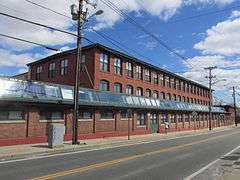
Geography
According to the United States Census Bureau, the town has a total area of 5.8 square miles (15 km2), of which, 5.7 square miles (15 km2) of it is land and 0.1 square miles (0.26 km2) of it (2.07%) is water.
Within the town, there are several villages and neighborhoods, such as Allendale, Centredale, Fruit Hill, Greystone, Louisquisset, Lymansville, Marieville, Woodville, and Geneva.
North Providence is bordered by Providence to the south, Johnston to the west, Smithfield and Lincoln to the north, and Pawtucket to the east. Has a total of 7 elementary schools, 2 middle schools, and a highschool.
History
Founding History
Settled shortly after the arrival of Roger Williams in 1636, North Providence was incorporated as a town in 1765. The originally incorporated town area included sections of the present-day cities of Providence and Pawtucket. Early colonial settlers in North Providence built stone-ender houses, such as the Joseph Smith House (1705) at 109 Smithfield Road, which is now listed in the National Register of Historic Places. In 1793, the first fully mechanized cotton-spinning mill in the United States, Slater Mill, was founded by Samuel Slater on the banks of the Blackstone River in North Providence. In 1874, the eastern section of North Providence where Slater Mill is located became Pawtucket, resulting in a large population decrease.[3]
Politics in North Providence
From its incorporation, North Providence was governed by a Town Council with a Town Clerk and a Town Treasurer. In 1974, the residents of North Providence elected their first mayor, Salvatore Mancini, who served the town in this capacity for 20 years. Since the installation of the first town mayor, North Providence has had four mayors who were elected by town residents and one mayor who was elected by the Town Council when the incumbent mayor at the time, A. Ralph Mollis, was appointed to the position of Secretary of State of Rhode Island. Below is a list of mayors who have served North Providence:
- Salvatore Mancini (1974-1994)
- G. Richard Fossa (1994-1996)
- A. Ralph Mollis (1996-2007)
- John Sisto (2007-2007)
- Charles Lombardi (2007-present)
The Centredale Manor Restoration Project Superfund Site
From at least 1921-1971, the Centredale Manor area of North Providence was contaminated by textile, chemical, and drum recycling industries that discarded toxic liquids and wastes into the surrounding soil and river (EPA 1999). In 2000, the United States Environmental Protection Agency declared a 9-acre (36,000 m2) area including parts of Centredale Manor and Brook Village, both affordable housing units for senior citizens, a superfund site. The agency documented high levels of toxic chemicals like dioxin, VOCs, and PCBs in fish as well as soil from the area. Because of this the area has been fenced off from the community with warning signs against eating contaminated fish, and is undergoing evaluation for clean-up.[4]
Town Council Arrests
On May 4, 2010, three members of the North Providence Town Council were arrested by the FBI and charged in Federal Court with taking a $25,000 bribe so that a developer could build a supermarket in their town.[5]
Recreation
Parks
The town has two major parks, Governor John A. Notte Memorial Park and Capt. Stephen Olney Memorial Park, both have various sports fields, playgrounds; Gov. Notte Park has a freshwater beach and campground.
In 2015, Camp Meehan opened at Gov. Notte Park. Mayor Lombardi championed the sale of the land to the town of North Providence after it was to be built over by condominium housing. The Mayor allowed the land to be beautified using grant funds which were awarded to the town. Camp Meehan includes a newly renovated, modern building overlooking the Wenscott Reservoir which can house 250 guests for weddings and other such events. The Camp Meehan Hall held its first event in 2016.
Events
North Providence has always been filled with lively events. Currently there are a few major annual events:
- Mayor Lombardi's Fishing Derby is held each year at Governor Notte Park and receives wide turnouts from towns over.
- The Memorial Day Parade Celebration is a large event which includes town wide events, a large parade route leads to Gov. Notte Park where a festival is held.
- Independence Day celebrations are usually held at Gov. Notte Park as well, a fireworks display is a crowning part of this celebration.
- Pumpkins in the Park is also held at Halloween time, and like most events uses Notte Park as its setting. Residents are encouraged to see pumpkins put on display by the towns Youth Commission.
- The town also lights a Christmas tree on the front lawn of the town hall each year. It is a joyous occasion which includes refreshments, games, and music by Stephen Morrison and the North Providence High School Band, which provides entertainment for many of the towns events.
Demographics
| Historical population | |||
|---|---|---|---|
| Census | Pop. | %± | |
| 1790 | 1,071 | — | |
| 1800 | 1,067 | −0.4% | |
| 1810 | 1,758 | 64.8% | |
| 1820 | 2,420 | 37.7% | |
| 1830 | 3,503 | 44.8% | |
| 1840 | 4,207 | 20.1% | |
| 1850 | 7,680 | 82.6% | |
| 1860 | 11,818 | 53.9% | |
| 1870 | 20,495 | 73.4% | |
| 1880 | 1,467 | −92.8% | |
| 1890 | 2,084 | 42.1% | |
| 1900 | 3,016 | 44.7% | |
| 1910 | 5,407 | 79.3% | |
| 1920 | 7,697 | 42.4% | |
| 1930 | 11,104 | 44.3% | |
| 1940 | 12,156 | 9.5% | |
| 1950 | 13,927 | 14.6% | |
| 1960 | 18,220 | 30.8% | |
| 1970 | 24,337 | 33.6% | |
| 1980 | 29,188 | 19.9% | |
| 1990 | 32,090 | 9.9% | |
| 2000 | 32,411 | 1.0% | |
| 2010 | 32,078 | −1.0% | |
| Est. 2018 | 32,559 | [6] | 1.5% |
| U.S. Decennial Census[7][8] | |||
As of the census[1] of 2000, there were 32,523 people, 14,209 households, and 8,368 families residing in the town. The population density was 5,720.2 people per square mile (2,207.0/km2). There were 14,867 housing units at an average density of 2,623.9 per square mile (1,012.4/km2). The racial makeup of the town was 91.98% White, 2.65% African American, 0.17% Native American, 1.85% Asian, 0.02% Pacific Islander, 1.58% from other races, and 1.76% from two or more races. 3.85% of the population were Hispanic or Latino of any race.
There were 14,351 households, out of which 22.4% had children under the age of 18 living with them, 44.5% were married couples living together, 11.5% had a female householder with no husband present, and 40.5% were non-families. 34.8% of all households were made up of individuals, and 13.8% had someone living alone who was 65 years of age or older. The average household size was 2.23 and the average family size was 2.91.
In the town, the population was spread out, with 18.3% under the age of 18, 7.5% from 18 to 24, 30.3% from 25 to 44, 24.1% from 45 to 64, and 19.7% who were 65 years of age or older. The median age was 41 years. For every 100 females, there were 87.4 males. For every 100 females age 18 and over, there were 83.5 males.
The median income for a household in the town was $37,897, and the median income for a family was $52,795. Males had a median income of $34,352 versus $27,553 for females. The per capita income for the town was $22,284. About 5.6% of families and 8.1% of the population were below the poverty line, including 9.8% of those under age 18 and 8.7% of those age 65 or over.
Notable people
- John Cafferty, leader of John Cafferty & The Beaver Brown Band
- Ernie DiGregorio, former NBA player
- Jim Gilchrist, founder of the controversial Minuteman Project
- Danielle Lacourse, Miss Rhode Island USA 2007; first runner-up at Miss USA 2007
- Joseph Olney, American privateer during American Revolution
- Zellio Toppazzini, NHL - AHL hockey player; Rhode Island Reds Player of the Century; Providence College head coach
- Cody Wild, former AHL hockey player
References
- "U.S. Census website". United States Census Bureau. Retrieved 2008-01-31.
- "US Board on Geographic Names". United States Geological Survey. 2007-10-25. Retrieved 2008-01-31.
- "Town History | Town of North Providence, Rhode Island". northprovidenceri.gov. Retrieved 2017-06-05.
- EPA,OSWER,OSRTI, US. "Superfund | US EPA". US EPA. Retrieved 2017-06-05.CS1 maint: multiple names: authors list (link)
- "Town council members accused of corruption". WJAR. 6 May 2010. Archived from the original on 10 May 2010. Retrieved 6 May 2010.
- "Population and Housing Unit Estimates". Retrieved September 4, 2019.
- "Census of Population and Housing". Census.gov. Retrieved June 4, 2016.
- Snow, Edwin M. (1867). Report upon the Census of Rhode Island 1865. Providence, RI: Providence Press Company.
External links

- Town website
- North Providence Recreation Department
